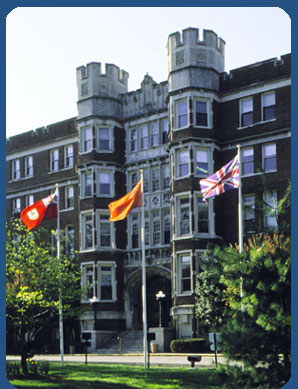| Women's Intellectual Contributions to the Study of Mind and Society Students, as part of an advanced seminar, examined and wrote about the lives of these women,
their intellectual contributions, and the unique impact and special problems that being female had
on their careers. |  |
| For information about referencing this paper - Click Here |
Mary Ellen Richmond
Mary Ellen Richmond was a woman who influenced the social work profession from the start. Richmond was born on August 5, 1861 in Belleville, Illinois. She was the only surviving child of Henry and Lavinia Richmond. At the age of three, Richmond's mother became ill and died, and was then sent to live with her grandmother and two aunts in Baltimore (Richmond,1974). Richmond then attended Baltimore Eastern Female High School, and graduated in 1878. After her graduation her aunt became ill, so it was Richmond's job to care for her until her death in 1888. Soon after her aunt's death, Richmond began working for the Baltimore Charity Organization Society. By 1897, she became serious in advocating the establishment of professional schools for the study of case work and began to stress the need for a formal social work education. This was the beginning of Mary Ellen Richmond's long career as a social worker.
In 1889, when Richmond began her career as a social worker, she started by doing charitable work. Through her work with charity and caring for the poor, Richmond was able to coordinate and specialize the social work profession. Her beliefs that the poor and helpless could be reformed, was a strong belief that got her the formalization of social work.
In 1909 Mary Ellen Richmond became the director of the Charity Organizational Department of the Russell Sage Foundation (Richmond, 1974). Because of this position in this organization, Richmond was able to direct major research in the field of social work.
One very important writing by Richmond includes a small handbook, Friendly Visiting Among the Poor. This is a handbook intended to point out various aspects which are important in doing charitable work in the homes of the poor. The different aspects include health, children, church, and saving and spending money.
Another important work By Mary Ellen Richmond is a book entitled, What is Social Case Work? This book is an introduction to case work and the social work profession. This publication outlines the different types of social work, such as social work in the hospital, in the home, in the workplace, and even including the court aspect of social work (Richmond,1922).
"Child Marriages" was a study performed by Mary Ellen Richmond and Fred Hall. This study goes in depth into marriages of the young. The study takes a close look at different aspects of marriages of the young. Some aspects include psychological, racial, social, geographical, and conflict issues with social welfare laws.
"A Study of Nine Hundred Eighty-Five Widows", is another study by Richmond and Hall. This study looks at families, work situations, and social welfare treatment of widows. This study also looks at marriage, children, financial resources, and characteristics of widows as mothers. The researchers look at the women before and after the death of the husband Richmond (Richmond,1974).
Through Richmond's career and research, it is obvious she had special ongoing interests in all aspects of marriage. Most of her studies and publications evolved from this strong interest.
Amazingly, Richmond's only traditional education was her high school career. She was a self- taught women who gained her knowledge from books because of her longing to learn. Her knowledge was not gained by attending any university, since social work training before 1890 depended on being self-taught, self-motivate, and any other opportunity on hand.
Works Cited
- Richmond, Mary Ellen and Hall, Fred. (1974). A Study of Nine Hundred and Eighty-Five Widows. New York: Arno Press.
- Richmond, Mary Ellen. (1922). What is Social Case Work? An Introductory Description. New York: Russell Sage Foundation.
Other Links
Back to Women's Page
